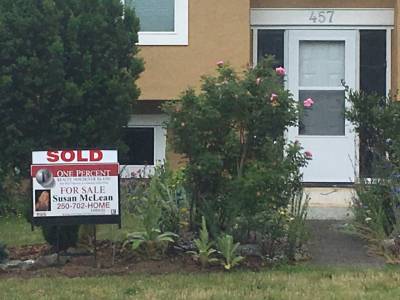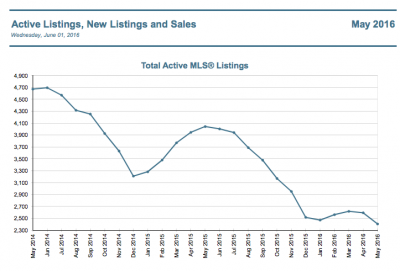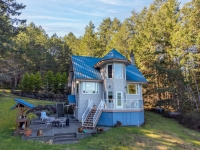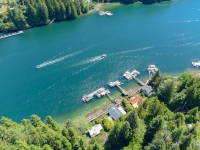Homes are selling like hot cakes in many areas within a few hours of Vancouver.
Back in January, we noticed an uptick in the number of buyers registering on our site. This was an early sign of things to come. It's no secret that real estate in many areas of British Columbia is hot right now. In the last few weeks, we have spoken to Realtors all around the province and many are reporting bidding wars, fast sales, and eager buyers. Much of the invigorated market is in areas within a few hours reach of Vancouver and the Lower Mainland. Some areas further East, like the Kootenays and Shuswap have picked up as well but are quiet in comparison.
In Vancouver, super low interest rates , combined with a very tight rental market and pressure from foreign investment have led to skyrocketing housing prices. A mini-exodus of young families and retirees to outlying areas of B.C. has ensued. Our member agents are seeing Vancouver homeowners cashing out and first-time buyers moving to areas where real estate is more affordable such as the Fraser Valley, communities on Vancouver Island including Victoria, Parksville and the Comox Valley, and the Gulf Islands.
In some of these communities, the already brisk real estate market conditions, plus this added pressure from former Vancouverites has pushed housing sales to almost frenzied levels. Moreover, transplanted Vancouverites are accustomed to a very competitive market and are more at ease with aggressive buying strategies including subject free and over asking offers. These strategies, combined with low listing inventories has created a scarcity, which is, in turn, driving prices up.
It's not just native British Columbians that are looking outside of Vancouver for real estate. While Germans and British investors have long been a market for B.C. recreational real estate, we are starting to hear anecdotal reports of increasing numbers of Chinese investors purchasing larger plots of land, small businesses and residential and recreational properties in these smaller communities. Finally, the low Canadian dollar, combined with the "Trump Effect" also has US buyers looking North for real estate again, putting even more pressure on the market.
The chart below, provided with stats courtesy of Landcor Data Corporation, shows the year over year price gains for single-family dwellings January - April 2015 to January-April 2016 in Metro Vancouver and on Vancouver Island. A notable fact is that the highest sale price for a Metro Vancouver single family home in this time frame was a whopping $31, 100, 000, whereas on Vancouver Island, the highest sale price was a mere $5, 285, 714 (!)
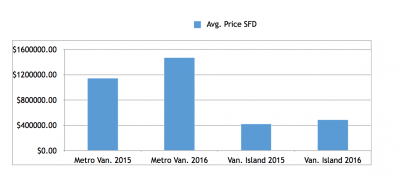 Average SFD price Jan-April 2015 vs. Jan-April 2016. Metro Vancouver & Vancouver Island.
Average SFD price Jan-April 2015 vs. Jan-April 2016. Metro Vancouver & Vancouver Island.
Victoria, in particular, seems to be a spillover area for Vancouver buyers, with one agent reporting that her last four sales were all to middle age Vancouver couples with young children making the move. In their June market summary, the Greater Victoria Real Estate Association reports:
"A total of 1,289 properties sold in the Victoria Real Estate Board region this May, an increase of 42.4 percent compared to the 905 properties sold in the same month last year.
Inventory levels remain lower than the previous year, with 2,406 active listings for sale on the Victoria Real Estate Board Multiple Listing Service® at the end of May, 40.5 percent fewer than the 4,043 active listings at the end of May 2015.
“These are very interesting times in local real estate,” notes Mike Nugent, 2016 President of the Board. “The market we are experiencing has exceeded our expectations. There are influences in the marketplace that we do not fully understand yet, like the impact of out-of-town buyers and millennials moving into the market, and the seemingly sudden international attention our island city has started to receive. And some folks may be buying now because they are concerned that the market is going to continue to increase in value. Traditionally spring is the most active season for real estate, so it will be interesting to see if this feverish pace continues into the summer months.” The Multiple Listing Service® Home Price Index benchmark."
This chart, showing the decline in listings in Victoria, tells the story in a nutshell.
Chart courtesy of Greater Victoria Real Estate Board.
If we take the Comox Valley as another example, Kutyn Appraisals reports that the sell to list ratio for May 2016 was 103 percent and the month to month comparison figures (May '15 over May '16) show price increases in the double digits. The challenge right now, according to one agent I spoke to here, is trying to get listings. She mentioned that people are afraid to sell because they are scared they won't be able to find anywhere to live.
Judging by the chart and statistics above, these concerns are valid. With the housing market so hot, many potential sellers might consider renting as an option; however, rental markets in some of these areas are equally as hot. With investors cashing in on long term holding properties, there are fewer options for potential tenants. The existence of AirBnB is also being cited as a factor in making rentals increasingly difficult to come by, especially in larger cities like Vancouver and Victoria. Having been a landlord for over 10 years in the Comox Valley, I can personally attest to the tight rental market. I have never seen so many eager and well-qualified people desperate to find a rental. After having to turn away some excellent potential tenants, I only wish I had more units to rent.
Our conclusion: If you already own real estate in one of these busy markets and are thinking of selling, it's a great time to list your property; however, make sure you have another place to rent or purchase when you sign the documents.
Late News: According to one article we read recently, the Vancouver market MAY be cooling ever so slightly due to increased government regulations taking hold; however, we are not holding our breath on that one. It could be just because people are afraid to sell for lack of housing inventory.


